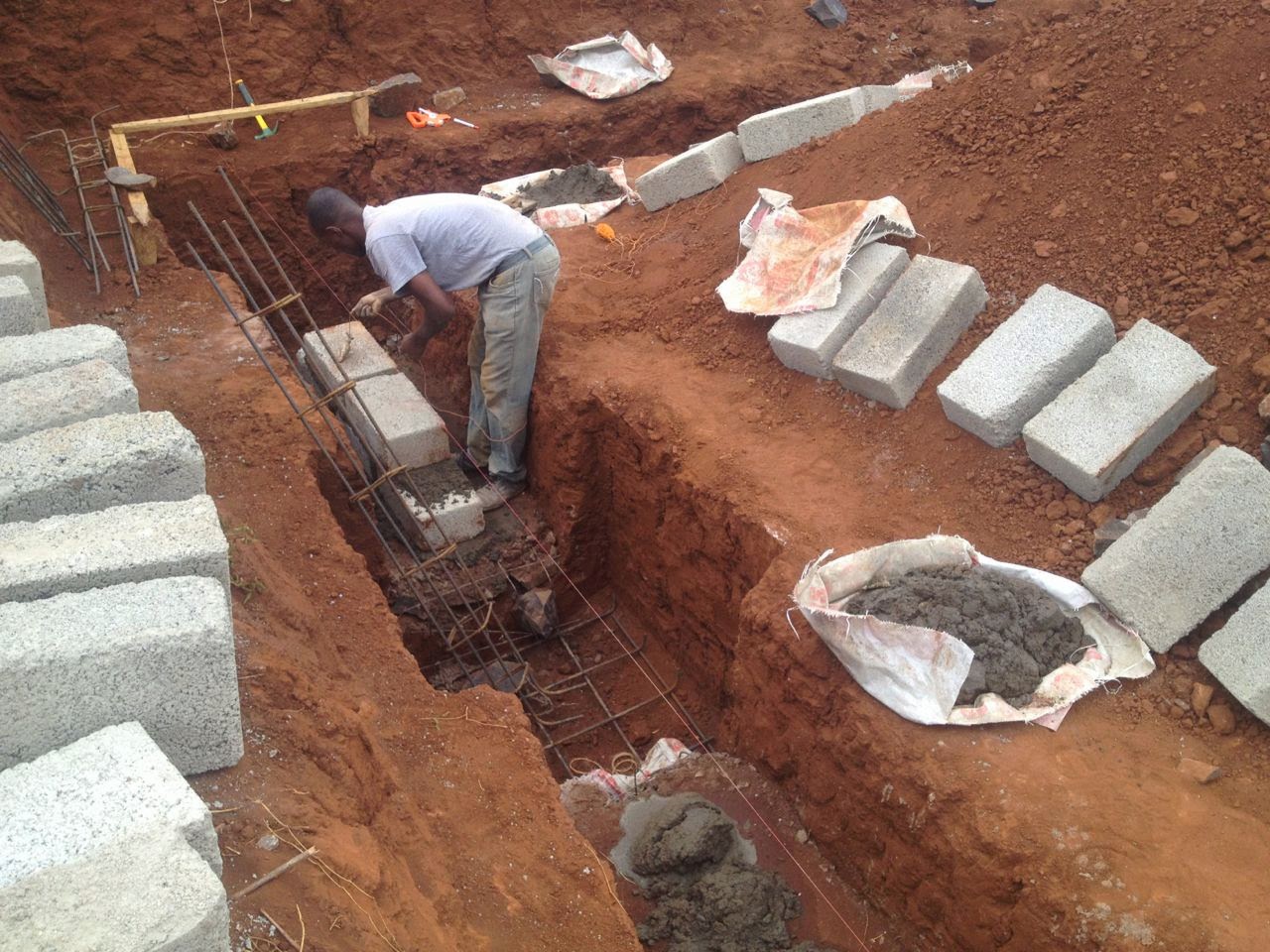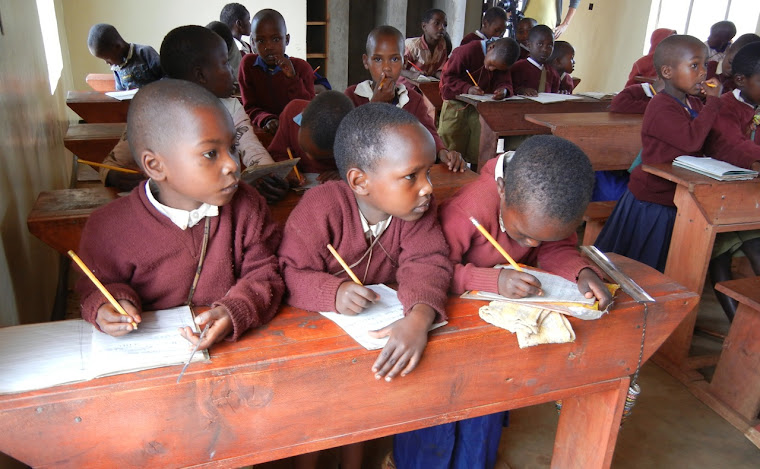1. Edith Gvora High School Project - Gongali Village
2. Patricia Elizabeth Primary School - Qameyu Village
3. Electricity to Gongali (Aslini) Primary School
Hi All
Greetings from Africa (Tanzania)
Gongali
Electricity
I just returned after three weeks
in the Karatu District organizing the construction of the new High School
project at Gongali and visiting the new Qameyu Village site for the first time.
But first an update on the Gongali School Electrical supply project. The
electrician, Sebastian Hilonga, completed the wiring of the classrooms and
teacher residences, and I just received shockingly good news from Project
Manager Mathew Sulle that Tanesco, the power company, has finally started their
work to install the transformer and power poles. So excitement is building
among the teacher families living there…
 |
| our Gongali Primary School transformer |
playtime…
…speaking of which, I decided that
a Sunday picnic for the teacher families would be a timely event at Gongali
Primary. For one thing, it’s an opportunity to celebrate the arrival of a 4th
teacher family to the little community. Emmanuel Pariso, his wife Sophia and
baby Gloria are delighted with their new home and friends.
Also, teacher Boniface is now married and has just returned from a honeymoon. A small man with a huge grin, he proudly introduced his tall shy bride Irene. Headmaster Mark Mollel and wife Sarah attended the wedding in Arusha, a well–deserved holiday for them.
 |
| chalkboard art greeting at picnic day. Note the portrait - they made me black. Yay! |
Also, teacher Boniface is now married and has just returned from a honeymoon. A small man with a huge grin, he proudly introduced his tall shy bride Irene. Headmaster Mark Mollel and wife Sarah attended the wedding in Arusha, a well–deserved holiday for them.
 |
| picnic day at Gongali |
a gift for PSFA
from the community
This Gongali School community is
growing. With the advent of Director Mark Burrowes electricity project, Mayor
Peter Hayshi is planning the relocation of his office here. On one of my visits
with him, we walked the site and he pointed out the location of a new church to
be built there soon. And to my surprise, he proclaimed a 2-acre plot next to it
as a gift to PSFA to build an office/accommodation building. Hey, we’ll seriously consider it; a great opportunity for drop in visitors to support our
cause as well as saving on accommodation expenses during our work here.
Edith Gvora High School
We are so fortunate to have solved
the biggest problem of any project – the selection of a good builder. Restus
(Rusti) Ernest is a former teacher but his passion was building. His resume is
a great benefit to our work. His English is great, he’s computer savvy, and
to top it off, he’s smart and excellent with construction.
The project is fast-tracked for
completion before Christmas this year. Construction didn’t start until I arrived,
as I needed to assure the proper siting of the buildings. I came with freshly
drawn plans for the minimum four buildings required for registration of the
school name. As usual the costing came in high, but through discussions with
Restus, some redesigning (with hand drawing, as I didn’t dare bring a computer
this time around as mine was stolen from my room during my last visit in
April/May) and some additional generosity from our donor Tony Gvora, we finally
arrived at a construction cost.
 |
| they mix the concrete on the ground |
 |
| digging trenches for the footings |
 |
| teacher residences at the high school site |
 |
| the erosion gully |
 |
| foundation wall trenches |
 |
| concrete brick foundation walls |
 |
| surveying the classroom buildings |
I also sent a design package to the top gun in the region, Mr Moses Mabula, the District Executive Officer, who on a previous occasion requested monthly progress reports of our work. And fortunately, his staff accepted my suggested changes to the government plans that we were given to follow. For example, I improved the Administration building layout by having indoor rather than exterior access to washrooms. (I couldn’t imagine staff running to outside doors in the middle of their heavy rainy season.)
To date, Restus has built the
floor slabs of the two two-classroom buildings and is doing the foundations for
the Administration and Toilet buildings. The walls weren’t up yet, but I did my
usual carpentry part of roof framing. How, you ask?? Well, I decided that the
trusses should be built with a little better engineering than ones on previous
projects. So I asked the B&B hotel if I could build on a nice level grass
area outside my room, and they allowed it.
I built three sample trusses, one for each building. I enjoyed figuring out a strong design that doubled up on the bottom chord members to allow alignment in a straight plane; it used more timber, but will also be more durable.
 |
| building roof trusses |
 |
| my load of truss timber |
 |
| the finished sample trusses (made with Steve Miller tools) |
I built three sample trusses, one for each building. I enjoyed figuring out a strong design that doubled up on the bottom chord members to allow alignment in a straight plane; it used more timber, but will also be more durable.
During my last visit, I drafted
an agreement whereby the construction would be a partnership between Primary
Schools for Africa (PSFA), the Gongali Village Government (GVG) and the
regional government, the Karatu District Council Office (KDCO). PSFA will
design and construct the buildings and GVG and KDCO will be responsible for
site services, ie, electricity, water, sewage, rainwater collection, roads and
paths and landscaping. Two important issues that they needed to address by the
end of this construction phase were the provision of water and septic systems
and filling a large erosion gully running between our new buildings.
 |
| L to R. Restus at far left, Mayor Hayshi centre in blue, DED Moses Mabula in brown suit, Alan, Engineer Julius Kaaya |
 |
| the Gongali Model Co celebrating the new high school construction |
A worrisome issue arose on my
last day in Karatu. Prime Minister Kikwete and his Ministry of Education has
just decreed that all high schools must build laboratories to increase the
breadth of science learning. For us, it now means we need to have a laboratory
building constructed before we can register the school, which will jeopardize
the donors naming of the school. The village or ourselves do not have the
additional $50,000 – $100,000 CDN extra that it would cost. We will see how
this develops over the next few months. Mayor Peter Hayshi was understandably
angry and so was I, to now have the rules change at this late stage, but he
assures me that he will resolve it somehow.
Patricia Elizabeth Primary School
Mathew and I went on safari, not
to see animals, but to scope out the new primary school to be built that is
funded by donor Ted Woodcock to memorialize his late wife Patricia Elizabeth.
Our destination was the tiny village of Qameyu located west of Babati Town, a 3
hour drive from Karatu to Babati and then a bone-rattling 2 hour drive from
Babati to the village on extremely rough and dusty roads.
 |
| Qameyu kids |
We were greeted at the village
office by the senior VIP and Project Manager, Ward Councillor Paulo Margwe, the District Education
Co-ordinator Mary Modaha and several other local political staff, who then led
us to the site which to my delight, was large and FLAT, (a plus for building).
I was surprised because it seemed to be the only level site in this hilly
community. Unlike most village schools, there is lots of room for a good sports field for soccer. We walked around the perimeter of this wonderful nine acre property,
with me sketching and pacing the distances, to eventually agree on the location
of the buildings. We’ll do the seven classrooms, they’ll do the outhouse-style
toilets. If future funds allow, they would like a kitchen/dining hall and
teacher residences.
 |
| fog screen at Qameyu site (captures early morning dew water - 10 litres per day) - an NGO projec |
 |
| gift of 200 lbs of potatoes (I gave my share to a local family in Karatu) |
 |
| official welcome by local kids who will be the first ones for the school |
 |
| the sign makes it official - there will be a new school here |
 | ||
| mapping out the building locations |
After passionate speeches (Mathew translating the Swahili ones) in front of a crowd of some smiling and some bewildered village elders, parents and children, we were presented with a gift of two hundred pounds of potatoes and our vehicle “walked” off the site surrounded by a group of colourfully dressed women chanting and adorning the car with plants and flowers. It was an amazing experience – a first actually.
 |
| chanting women "walking" our vehicle from the site |
And now, back to the hotel where...
...we ate Carlos for dinner
The stay at the hotel this time was more enjoyable than previous ones. Security had been tightened up since my room was broken into last trip. But it was high season with a lot more tourists staying here, as well as new NGO's with their various projects projects. The highlight was meeting a lively group of young Germans who had been on a whirlwind tour of Lutheran church facilities. It was the birthday of their director Wolfgang and to acknowledge his work in Tanzania, the local church gave him a goat which the group named Carlos. Carlos was a bit of a problem for sensitive Wolfgang; he was not comfortable with Carlos' supposed demise of being served of dinner. To add to that, Kerrie Robertson, a long term hotel guest working here with an NGO developing programs for HIV infected village women, took a liking to Carlos. And she would have daily visits to ease his loneliness while tied up at a tree near her room. So Carlos was spared…at least while the Germans were there. But on the day after they left, the staff inherited the gift and with the least bit of hesitation, decided to treat the remaining guests with the popular Tanzanian delicacy of roast goat. After a few mouthfuls during that evening meal I gagged when someone whispered…"That was Carlos". It was strange and somewhat sad to have eaten something with a name, but more so for Kerrie to have lost a friend as quickly as she had found one.
So now its back to Canada to
continue with fundraising to help with the Gongali laboratory building as well
as our other school projects that need us to continue with their building
program. We are getting busy, but I’m lovin’ it!
Alan
End of Update

